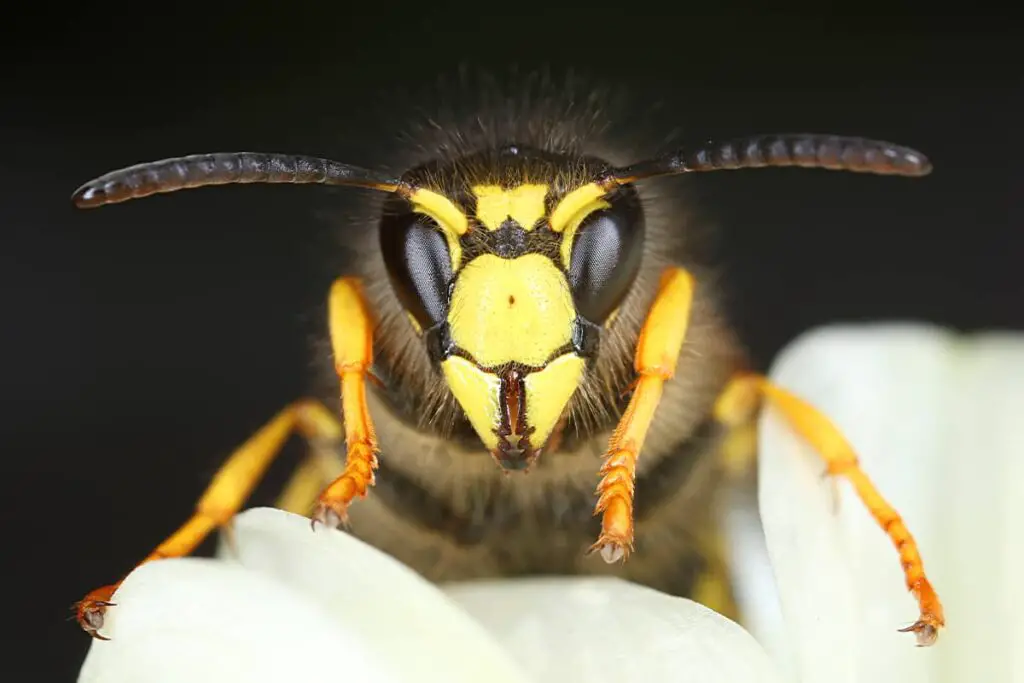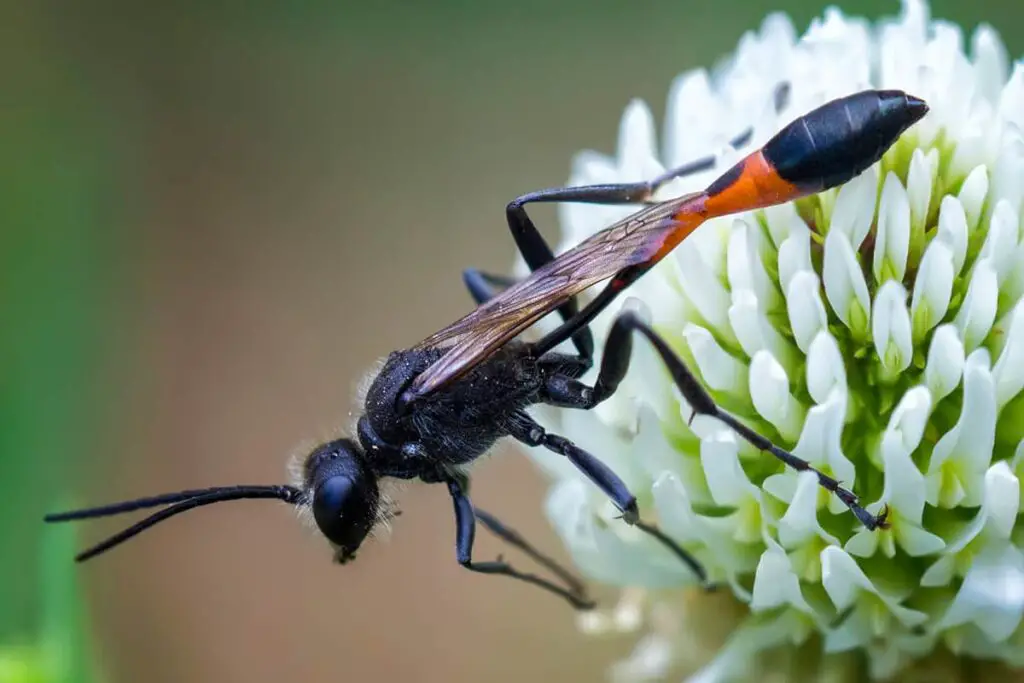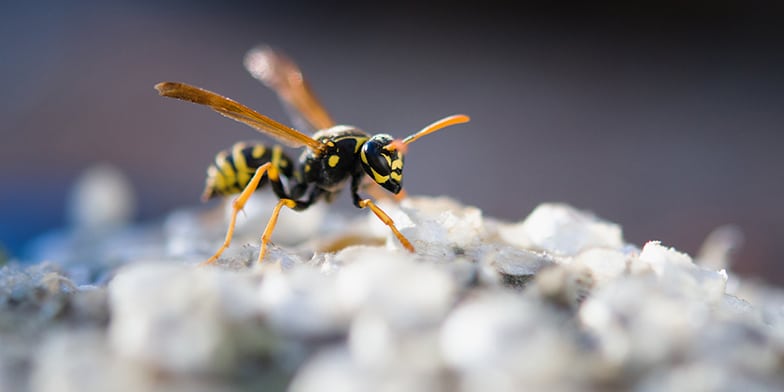
No one wants to live with a wasp’s nest in their backyard. Disturbing the nest will likely end up making the wasps more hostile towards you, and you’ll likely end up being stung. If it’s got to go, the best way to get rid of a wasp’s nest is by spraying it. This will kill the wasps, and so you can remove the nest without being attacked.
To do this safely you’ll need to pick the right time.
Wasps will start to return to their nest at dusk, and will remain there throughout the night. This makes it the ideal time to spray and remove them from your property. Be careful, though. Although dormant and sluggish, the wasps will not be asleep. They can respond aggressively to threats to their nest, even at night.
Do Wasps Sleep in Their Nest at Night?
You might have noticed that wasp activity tends to decline during the night. There are a few biological reasons for this.
The most important is the lack of light. Like bees, wasps are unable to see clearly in the dark. As the sun goes down it becomes impossible for them to navigate. As a result, before nightfall they will return to the safety of their nest. If a wasp is trying to fly at night, they will be attracted to light sources, but they tend to just end up bumping into windows and getting completely lost.
Another crucial factor is the cooler temperature at night. As it gets colder, wasps will start to become more lethargic as a way of conserving energy. This can be seen especially clearly during the winter months, when many wasps will spend most of the day inside the nest.
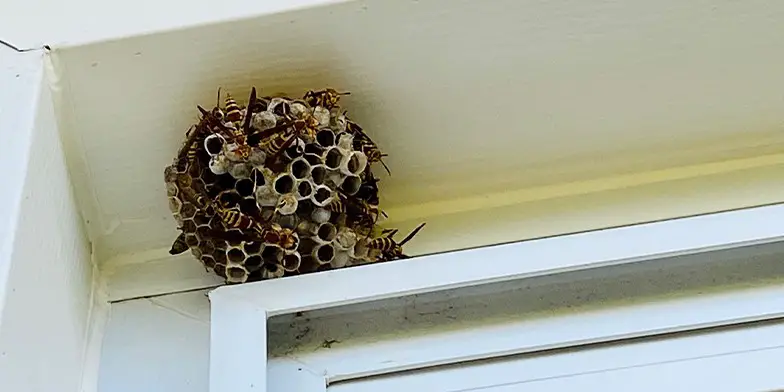
Dormant, but Not Sleeping
While the wasp activity might decline, that doesn’t mean that the wasps are sleeping. They have only become what is called ‘dormant’. They are resting, but they’re still aware of what is going on around them. If they feel their nest is under attack, they will come out to protect their home. Furthermore, wasps will take advantage this downtime to feed and nourish their young.
The Best Time to Approach a Wasp Nest
Wasps will be most dormant (and off their guard) during the night. This makes it a good time to approach and spray the nest. The good news is that it doesn’t need to be pitch black to do this. As the sun begins to sink in the late afternoon sky, they will be returning home. By the time it is fully dark, they should all be together at the next.
You also don’t want to leave approaching the nest too late. Wasps are early risers, and when the first rays of sunlight start to appear the wasps will start to leave their nest. This can mean that you will again become vulnerable to attack.
When Are Wasps Most Active?
If you have a wasp nest in your area, you will need to know when to avoid them. It’s often best to steer clear during the middle of the day. When it is the hottest, they will be the most active. If you pose a threat to their nest during this time, you could be facing a lot of trouble.
Most nests will contain a large number of wasps, often with thousands of individuals. They will be able to use pheromones to communicate, so they can attack you like a swarm. Because of this, there is a high probability that you will be stung.
Do Wasps Attack at Night
There is very little chance that you will be stung by a wasp if you’re just walking around at night, as they are will all be dormant and awaiting the new day. If you’re planning to attack their nest, that is an entirely different story.
Wasps will sting when they feel like you are threatening their territory. In this case, the soldier wasps will release a pheromone which tells the rest of the nest that there is an imminent threat and it’s time to go on the offensive. In the unlikely event that you do get attacked at night, there are a few things that you can do to protect yourself.
If the wasps are attacking you, or threatening to attack you, try to move slowly. If you are moving quickly (running, for example), it can make the wasps feel even more threatened. As a result, the attack will intensify. Try to get into an enclosed room. This should be somewhere where the wasps will be unable to enter. As you are moving, make sure to protect your head as much as you can, as the wasp will target this area first. If you do get stung, here are a few remedies that you can use to soothe the irritation and pain.
Should I Spray a Wasp Nest at Night?
Now that you know when the wasps are dormant, it’s time to decide when you are going to spray the nest. This is a critical decision, determining whether you will be able to remove it without being stung.
You should spray the nest at night. This is when the majority of the wasps will be in the nest. However, you want to make sure that you are removing as much of the nest as possible. Because of this, you should wait until it is the coldest part of the night. This is when the wasps will be the least active, making them the least likely to attack you.
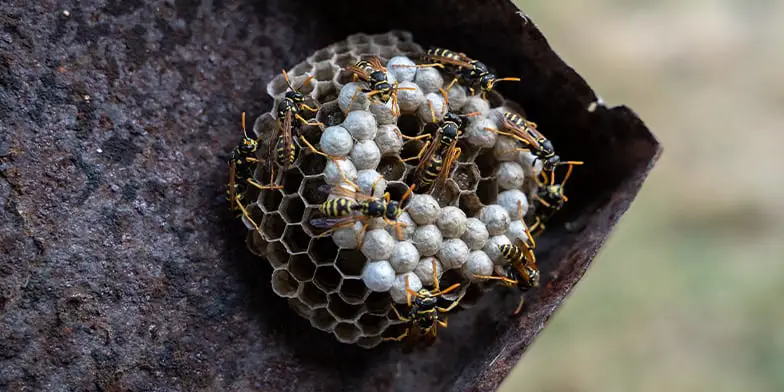
How to Spray a Wasp Nest
Just waiting until it’s cold and dark isn’t enough. To protect yourself (and anyone helping you out) you need to make sure you understand how to spray the wasp nest properly. First, you need to identify the type of wasp nest. This will determine whether you can deal with it yourself or whether you will need to use a pest control expert.
If you have a paper wasp nest, they should be fairly easy to deal with yourself. If you have yellow jackets or bald-faced hornets, you will need to call in a professional. Trying to remove these yourself will often end with you getting stung.
If you’re not sure about which type of wasp you’re dealing with, or you’re nervous about the procedure, don’t take the chance. Call in the professionals. It’s what they’re trained to do.
If you’re curious about the wasp nest removal process from the perspective of a professionals, I highly recommend having a look at the Hornet King YouTube channel. It can be fascinating to watch.
If you’re still determined to handle the nestr yourself, you will also need to think about whether it will be safe for you to spray the nest. If you can only reach it by standing on a ladder, it should be left to the professionals. When the wasps start to come out of the nest, there is a good chance that you will fall off the ladder and seriously injure yourself.
You will also need to get the right insecticide spray. This can be purchased from most hardware stores. If you are dealing with a bigger nest, you should use two bottles. The first bottle should be used to coat the outside of the nest, killing any wasps inside. Remember to direct the initial spray towards the main entrance to the nest, so wasps emerging from the nest to counter-attack will be killed as they leave. Save the other spray bottle for wasps outside the nest that try to sting you.
Before you start spraying, think about your escape route. Remember, you might be moving quickly to avoid getting stung. For safety, making sure you have a clear and direct path to safety. If you share the house with other people, warn them that you are about the spray the nest. Make sure any pets are safely indoors, or out of the way.
You will also need to think about the type of clothing that you are wearing. You’ll want to pick a long sleeve shirt and pants. Maximum coverage will provide protection if they attempt to sting you.
Removing the Nest
Once you have sprayed the nest, you’ll need to remove it. This will prevent a new swarm of wasps from taking up residency. It’s best to wait around 24 hours before you remove the nest. This ensures that the old wasp population has either died or moved away. Again, it’s best to wear long sleeve clothing when approaching the nest. You should also carry a bottle of wasp spray, just in case there are some angry survivors.
Conclusion
Having a wasp nest on your property can be a big problem. No one wants to deal with the pain of removing one, but even more than that – no one wants to deal with then pain of being stung! Thankfully, at night they will become more dormant. Most of the wasps will retreat to the nest, and the odds of being stung become much lower. This makes it the ideal time to spray the nest and remove it from your property.
Best of luck.
Driven by a passion for those tiny creatures that rule our world, we at Bug Domain strive to be your go-to resource for information on insects.


